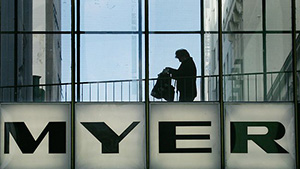
Can Bernie turn Myer (MYR) around?
Since returning to the share-market four years ago in a listing we described as too hot to handle HERE, the economics of Myer’s operations have deteriorated. We forecast this back in 2009 in our blog piece entitled Would You, Should You Buy Myer? Stakeholders involved in the recent annual July 2013 review will be questioning whether CEO Bernie Brookes can turn this department store business around.
Over the three years to July 2013, revenue has declined by 4 per cent to $3.145b, Earnings before Interest and Tax has declined by 21 per cent to $215m while EBIT/ revenue margins have deteriorated 1.5 per cent to 6.8 per cent. These are not the ‘north easterly’ figures we look for in our investing.
Return on Average Equity over the three years under review has deteriorated to 14.5 per cent, while store investment has seen net indebtedness rise to $340m. The fundamentals do not resemble an extraordinary business with bright prospects, and Montgomery will continue to avoid Myer.
Despite our misgivings, some ‘value’ investors will look at Myer’s earnings per share of 22 cents and their historical PE of 12.3X (at the current price of $2.70 per share) and inevitably jump on the “cyclical-recovery-in-consumer-spending” bandwagon story”. We however are unable to understand how switching between “cyclicals” and “defensives” and back again can be described as investing.
| Year to July |
2010 |
2013 |
Change |
| Revenue ($m) |
3,284 |
3,145 |
-4% |
| EBIT ($m) |
271 |
215 |
-21% |
| EBIT Margin |
8.3% |
6.8% |
-1.5% |
| Net Profit ($m) |
169 |
129 |
-24% |
| Shareholders’ Funds ($m) |
857 |
906 |
+6% |
| ROAvgE |
21.0% |
14.5% |
-6.5% |
| Net Debt ($m) |
314 |
340 |
+8% |
TPG who owned Myer before floating it did very well out of it. Gullible investors bought on the float at $4, I don’t know why people couldn’t see that TPG were selling at an inflated price and were just out to make a fast buck. TPG talked the talk about how they will run Myer with the best department store standards in the world. Buffett has warned about this before, he’s talked about private equity/leveraged buyouts (LBO) and how they are all talk and no action. These private equity firms don’t have retail experience like they claim, they are just good at squeezing short term value out of something.
And they hit the headlines because the government were chasing them for tax money. But at the same time this was happening, a lot of private equity companies lost lots of money. Books shops and fashion stores gave some private equity companies big losses. I think TPG made over $1b out of owning Myer in 4 years and they consider themselves lucky that they made so much money while a lot of others lost a lot of money.